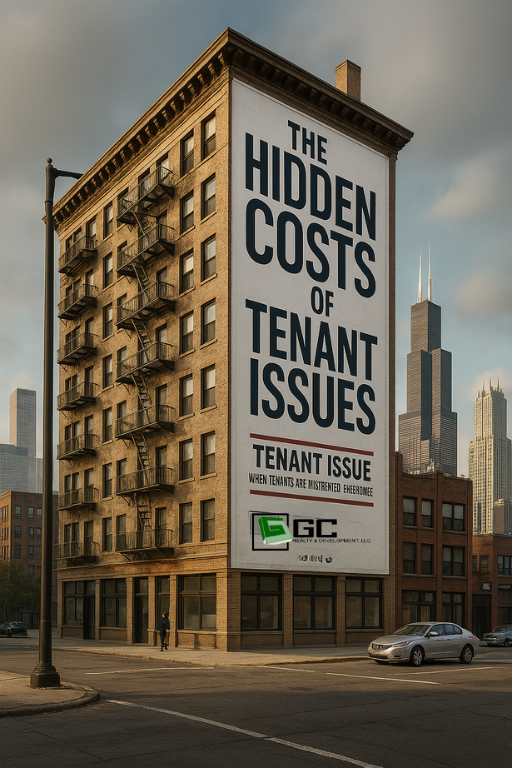It started with a great application—solid job, decent references. John thought he had found the perfect tenant for his Chicago rental. But within a few months, rent payments were late, complaints from neighbors started rolling in, and the property was showing signs of neglect. Before long, John found himself drowning in unpaid rent, legal battles, and mounting repair costs.
As a Chicago property manager or landlord, stories like John’s are far too common. A bad tenant can cost you far more than just missed rent. From legal headaches to property damage and extended vacancies, the hidden costs can quickly spiral out of control. Here’s what you need to know about the financial and operational risks of leasing to the wrong tenant—and how tenant screening can help you avoid these costly mistakes.
1. The Nightmare of Unpaid Rent & Eviction
John’s tenant initially paid on time, but after a few months, the excuses started. "I lost my job," "My paycheck is delayed," "I’ll pay next week." Before he knew it, John was several months behind on rent, and the eviction process in Chicago was his only option—a three to six-month (If you are lucky) ordeal filled with legal fees and stress.
Eviction Costs Breakdown:
Missed rent payments: $1,500–$5,000+ (depending on rental rates and duration of nonpayment)
Court and attorney fees: $1,500–$4,000
Sheriff lockout fees: $200–$500
Lost income during vacancy: $3,000–$10,000+
Even if the eviction is successful, landlords rarely recover the full amount owed.
2. The Property Damage Horror Story
When John finally regained access to his unit, he was horrified. Walls were damaged, carpets ruined, and appliances broken beyond repair. The tenant had left in a hurry, but not before leaving thousands of dollars in damage.
Estimated Costs:
Cosmetic repairs (paint, flooring, minor fixes): $2,000–$5,000
Major damages (appliances, plumbing, HVAC): $5,000–$15,000+
Full property rehab after severe neglect: $20,000+
Skipping or rushing tenant screening increases the risk of renting to someone who may not respect your property.
3. The Legal Battle No Landlord Wants
Chicago’s rental laws heavily favor tenants, and landlords who fail to follow Illinois landlord-tenant laws properly can face hefty fines. John’s tenant knew the system well and dragged the process out, further increasing his losses.
Legal Penalties:
Failure to comply with RLTO: Up to double the security deposit plus attorney fees
Fair Housing Act violations: $10,000–$50,000+ per offense
Lease enforcement battles: Thousands in court costs and legal fees
A well-documented leasing process and a legally sound tenant screening system can help landlords avoid these costly missteps.
4. The Vacancy Void That Drains Your Profits
After evicting his bad tenant, John faced another challenge: re-renting the unit. But now, it needed serious repairs, and the negative online reviews from his previous tenant scared away potential renters.
Vacancy Cost Calculation:
Average rent in Chicago: $1,500–$2,500/month
Vacancy period (2–4 months): $3,000–$10,000 lost
Marketing and leasing costs: $500–$1,500
Thorough tenant screening ensures you don’t rush to fill vacancies with unqualified tenants who might repeat the cycle.
5. The Emotional & Time Drain That Comes With a Bad Tenant
The worst part? The entire ordeal drained John’s time and energy. Constant stress, endless calls with attorneys, unexpected expenses—it took months to recover. This experience made him rethink his approach to leasing.
Many Chicago landlords find that outsourcing property management and using professional leasing services can significantly reduce these headaches. A streamlined tenant screening process ensures you’re placing reliable tenants who pay rent on time and take care of the property.
How to Avoid the Nightmare of a Bad Tenant
John’s story is an unfortunate but all-too-common reality for landlords who skip thorough screening. A bad tenant can wipe out a year’s worth of profits—or worse. But the good news? You can prevent these costly mistakes with a proven tenant screening system.
💡 Want to master tenant screening and avoid bad tenants in Chicago & the suburbs? Download our FREE guide:
Mastering Tenant Screening in 2025: Chicago & Suburbs Leasing Guide
This guide will show you step-by-step how to properly screen applicants, detect red flags, and ensure you’re placing high-quality tenants in your rental properties.
Don’t wait until you’re stuck with a nightmare tenant—protect your investment today!

 Vendor Portal
Vendor Portal


